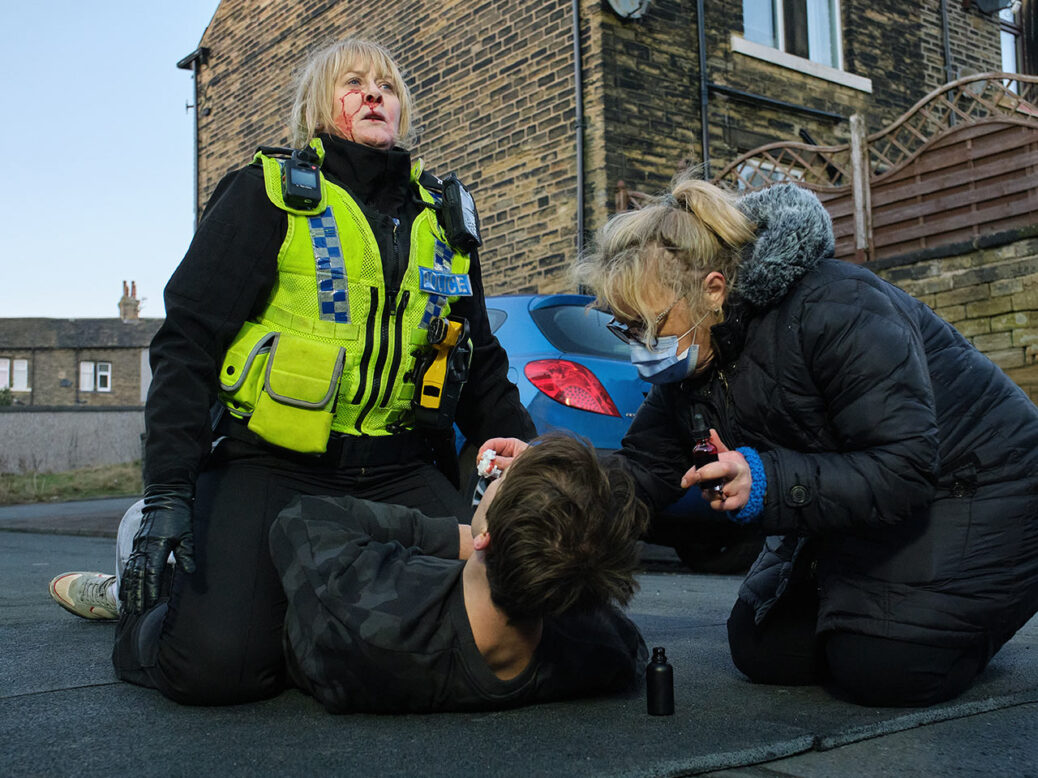
In the penultimate episode of BBC One’s Happy Valley, the escaped serial rapist and triple murderer Tommy Lee Royce (James Norton) dismounts the bicycle that has become his getaway vehicle and stares out over West Yorkshire’s Widdop Reservoir. With the uneasy crescendo of Ben Foster’s score, the stunning Calder Valley scene is transformed into something at once hopeful and sickly with impending terror.
Over the best part of a decade, Sally Wainwright’s police procedural Happy Valley – which concludes this Sunday (5 February) – has shown viewers both the hope and terror of life in the north of England, using interlocking traumas of lives in the town of Hebden Bridge to reveal the damage that austerity has wrought on Britain’s social fabric.
In his powerful 2009 documentary Shed Your Tears and Walk Away, the director Jez Lewis showed how the quirky bohemian exterior of Hebden Bridge masked the drug and alcohol addictions spreading through its young people like a contagion, and that they had deep-seated and complex underpinnings. Locals have historically referred to “valley bottom fever”, a regional variant of seasonal affective disorder in an area where steep hills can obscure the sunlight’s glare. Shed Your Tears and Walk Away was released one year before the David Cameron government began its austerity programme, which disproportionately affected deprived northern regions and decimated addiction services.
Addiction has been a central theme to Happy Valley since its first episode in 2014. Viewers have watched Clare Cartwright (Siobhan Finneran) rebuild her life in recovery from the blizzard of alcohol and heroin dependency. In its third series, though, addiction is no longer confined to the town’s street drinkers and the disenfranchised. In much the same way that austerity has begun to harm the traditional middle class, chronic drug use is here shown to be burning through white-collar professionals in pristine new-build homes. A titanically out-of-his-depth pharmacist (Amit Shah) murders a neighbour to whom he has been illegally supplying diazepam. One character complains that her own probation officer turns up to appointments “half-cut or doped up to her eyeballs on anti-anxiety meds”.
[See also: Boomers’ generosity to their kids is warping British society]
Happy Valley’s protagonist, Sergeant Catherine Cawood (Sarah Lancashire), has always been shown as an unusually diligent community officer, plugging the gaps where adult safeguarding should be. In this final series, Wainwright repeatedly prompts viewers to consider the impact of funding cuts in the valley. When Cawood finds out that her grandson Ryan has been visiting Royce in prison, her DI points out that “prison services are even worse staffed than we are”. Royce’s eventual escape is partially facilitated by an understaffed court, and partially because – as one Halifax mobster points out – police “don’t have the resources” to adequately surveil the show’s Kneževic crime family. In another storyline, a vulnerable adult falls from a window they should not have been able to fully open. Residents complain of faulty sprinkler systems. Why? “Council contracts are very lucrative so everyone wants them,” explains Cawood, “including – surprise, surprise – criminals.” The housing on her patch is deeply inadequate, “but people only find that out when it fails”. Like The Wire before it, Happy Valley shows the complex relationship between communities and institutions in endemic decay.
Of course, there are still growth opportunities in the new north. In one scene, the gangster Darius Kneževic (Alec Secareanu) terrorises an underling in an asbestos-addled car park while grandly fantasising about turning it into luxury flats (“swimming pool in the basement, garden on the rooftop!”).
Aired throughout January, this latest series has been shown alongside the horrific real-life news about the serial rapist and former elite Metropolitan Police officer David Carrick – only the most recent in a series of bruising scandals for the Met. For some policing shows, this juxtaposition might compromise their appeal, but Wainwright’s writing has always been ambivalent about the profession it portrays. In its second series, viewers watched as police sergeant John Wadsworth (Kevin Doyle) abused his position in an investigation to maim and murder a woman with whom he was in a sexual relationship.
Instead of becoming an icon of police power, Cawood has emerged instead as a patron saint of a certain type of working woman. In Vogue Terri White has written that the “bullshit-intolerant, hilarious, human, beautifully northern” Cawood represents “an entirely new kind of middle-aged woman on TV screens”. Perhaps echoing Wainwright’s own career – the Huddersfield dramatist has spoken of being overlooked for recognition because of her gender – the disregarded working woman is a key fixture in not just Happy Valley but the writer’s Gentleman Jack and the quietly subversive Last Tango in Halifax. Only with Happy Valley has Wainwright received the levels of industry acclaim afforded more easily to her male counterparts, such as the Line of Duty creator Jed Mercurio. Where Mercurio’s scripts often make grandstanding points about the state of the nation, Wainwright uses naturalistic dialogue and a specific grounding in place to mount a far more convincing critique. The deep psychological complexity of her characters makes Happy Valley the most important British crime drama since Jimmy McGovern’s Cracker in the 1990s.
As the show approaches its 70-minute finale on Sunday night, it has begun to ask profound questions about trauma and its hold across lives. Can Ann Gallagher (Charlie Murphy), ploughing her energies into police work, ever out-lap the misery of her rape and abduction? Can the sons of awful men escape an inheritance of violence? Can Sergeant Cawood, dealing with everyone’s suffering but her own, finally find justice for the death of her daughter which has haunted her across the show’s entire run? And can the north – depicted here with an unusual level of sensitivity and nuance – ever recover from the stinging consequences of underinvestment, cuts and neglect?
Happy Valley’s last episode airs at 9pm on BBC One on Sunday 5 February.
[See also: There is an alternative to austerity]





